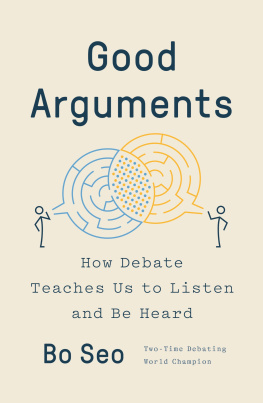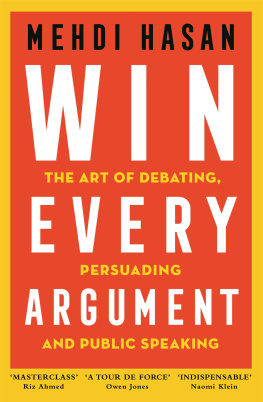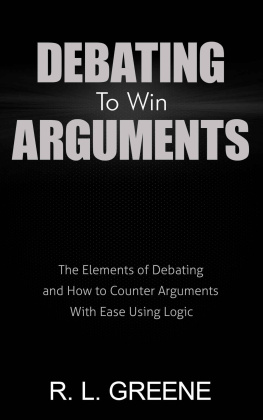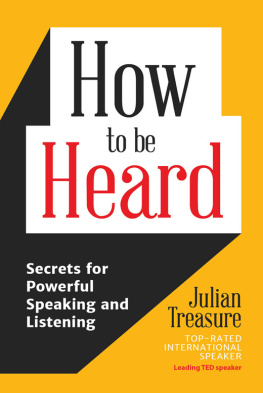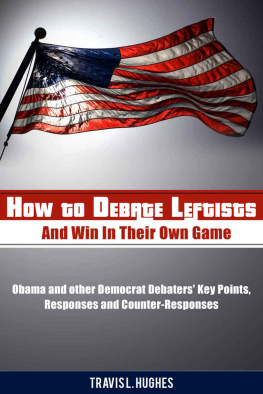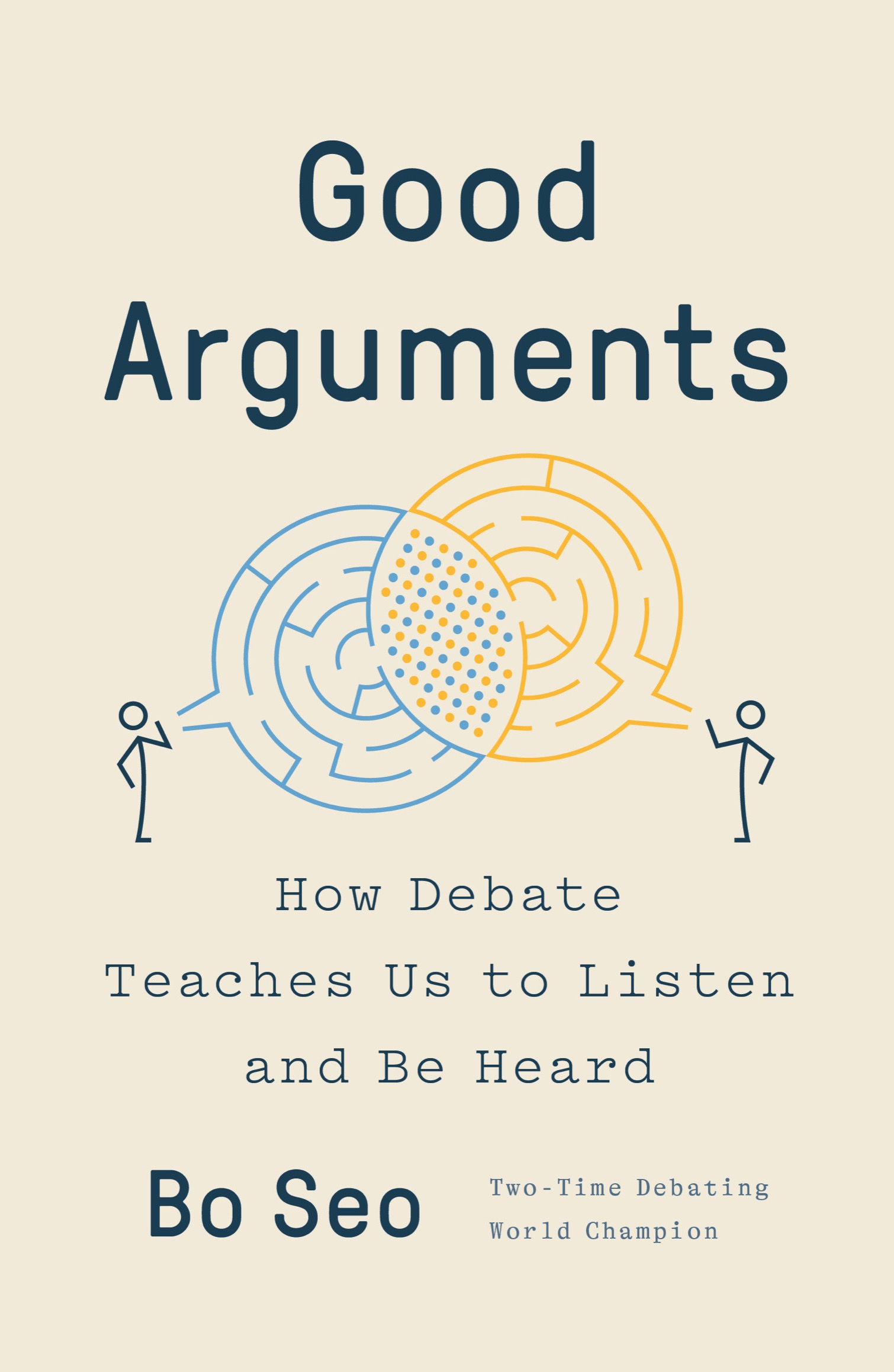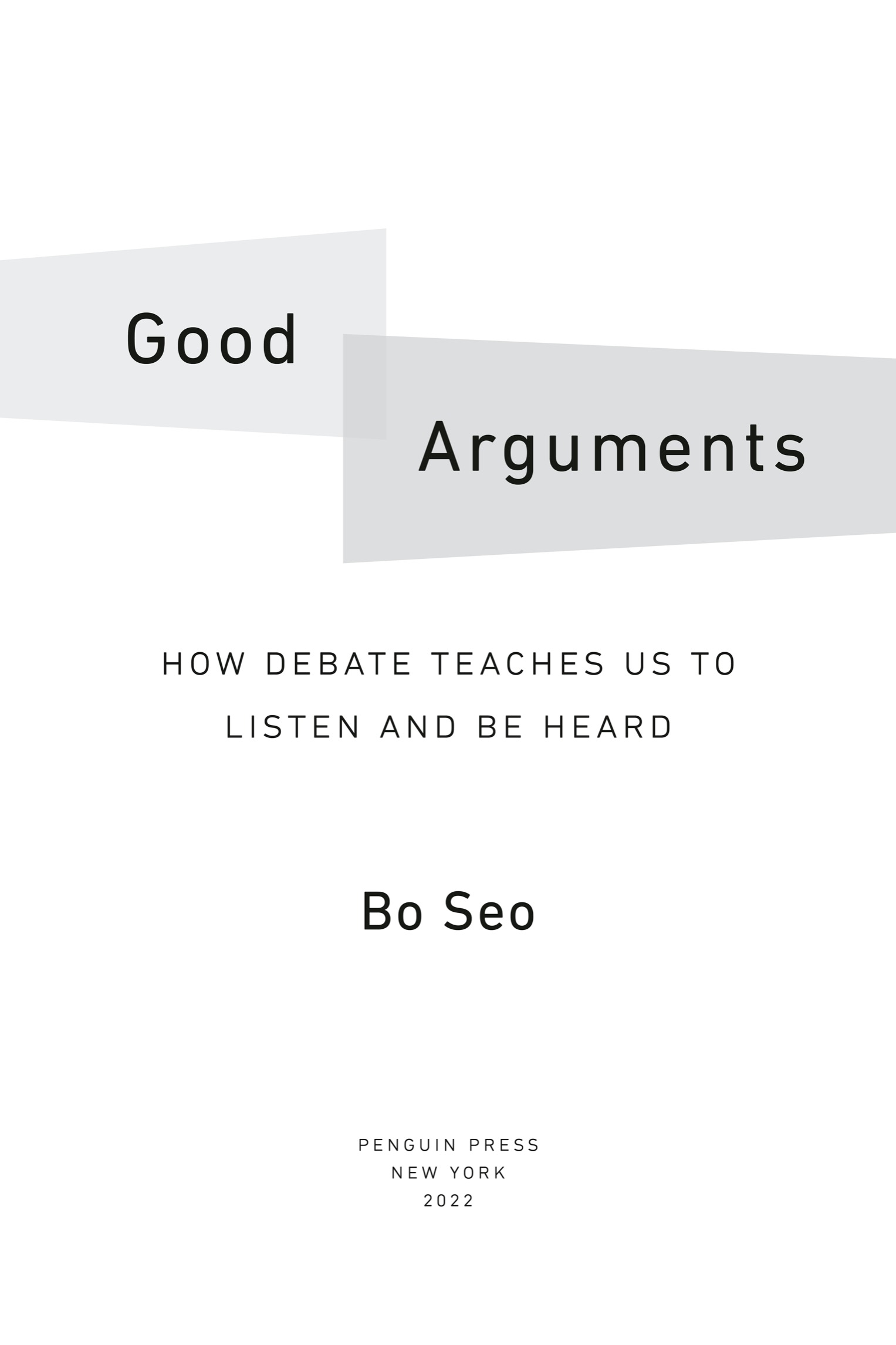Penguin Random House supports copyright. Copyright fuels creativity, encourages diverse voices, promotes free speech, and creates a vibrant culture. Thank you for buying an authorized edition of this book and for complying with copyright laws by not reproducing, scanning, or distributing any part of it in any form without permission. You are supporting writers and allowing Penguin Random House to continue to publish books for every reader.
Names: Seo, Bo, author.
Title: Good arguments : how debate teaches us to listen and be heard / Bo Seo.
Description: New York : Penguin Press, 2022. | Includes bibliographical references and index. Identifiers: LCCN 2021058137 (print) | LCCN 2021058138 (ebook) | ISBN 9780593299517 (hardcover) | ISBN 9780593299524 (ebook)
Subjects: LCSH: Debates and debating. Classification: LCC PN4181 .S34 2022 (print) | LCC PN4181 (ebook) | DDC 808.53dc23/eng/20220318
Some names and identifying characteristics have been changed to protect the privacy of the individuals involved.
Bo Seo is available for select speaking engagements. To inquire about a possible appearance, please contact Penguin Random House Speakers Bureau at or visit prhspeakers.com.
INTRODUCTION
Before my ninth birthday, I lost the ability to disagree. I experienced the loss as a kind of erosion: there was no disabling moment, only a slow and steady fade. In the beginning, I resisted. Though the words caught in my throat, I found ways to spit out my objections. But then I tired of the effort, risk, and self-disclosure that arguments entail. So I began to linger in the silences between speech and, once there, told myself I could find a way to live in this safe and hidden place.
It was July 2003 and my parents and I had just moved to Australia from South Korea. The decision to immigratein pursuit of fresh opportunities in life, work, and educationhad excited me in the beginning, but now in Wahroonga, this quiet, wealthy suburb in the north of Sydney, I could see that it was a folly. We had left behind good friends, food made with actual spices, and 48 million people who spoke our language. And for what? The alienation I feltin the refrigerated aisles of Woolworths or atop the jungle gym at the local parkhad the irritating quality of being boldly chosen.
In response to my complaints, Mum and Dad were sympathetic but unmoved. I got the sense from how they repeated the word transition that discomfort and confusion had been accounted for in some grand arithmetic.
My parents were somewhat dissimilar to each other. Dad grew up as part of a sprawling, conservative family in a country town on the easternmost point of the Korean Peninsula. Mum was raised by urbane progressives in Seoul. He eschewed material comforts; she had an instinct for glamour. He loved people; she prized ideas. However, the stages of immigration brought to the fore qualities they shared: a fierce independence and a determination to realize their dreams.
I spent these early weeks in Sydney in the back seat of a rental car as my parents zipped around town working through a list of tasks. Furniture purchases, tax file number registration, an apartment leaseeach tied us more closely to this city but none inspired a sense of attachment. When I asked if there was anything I could do, my parents said I had only one job: Find your feet at school, okay?
The locals in Wahroonga knew the elementary school in their suburb as the Bush School. Surrounded by a wildlife reserve, the school campus was always on the verge of being overrun by plant life. Thickets of bush clawed against classroom windows and ear-sized mushrooms bloomed on the seats of the abandoned amphitheater. In the summer, the place was lush and green. But on this wintry Monday morning in August, my first day of third grade, the leaves shimmered pale silver and the boundaries of the campus were covered in shadows.
At the blackboard in class 3H, Miss Hall, a young woman dressed in powder blue, wore an expression so soft that it seemed to dissolve every edge on her face. She gestured for me to come through the door and, as I shuffled to the front of the room, wrote on the board in perfect cursive: Bo Seo, South Korea. In front of me, some thirty pairs of eyes widened at this unlikely combination of words.
For the rest of the week, I found myself at the center of the classs attention. On the playground, I learned that the shtick that played for the most laughs was mock argument. One of my classmates would praise some achievement of Western civilizationHow good is white bread?and I would respond, using the dozens of English words within my reach, No, rice is better! The other kids shook their heads but could not disguise their exhilaration at the hint of conflict.
However, over the course of the month, as the novelty of my presence subsided, disagreements between me and my peers took on a different tone. When conflict arose on the sports field or in a group project, my halting attempts to express myself caused exasperation and flashes of anger. In these zero-sum situations, I learned that the distance between being odd and being at odds was short, and a gesture or some words, misinterpreted or misconstrued, could push one over the line.
The worst part of crossing language lines is adjusting to live conversationto its rapid, layered rhythms and many about-faces. In an argument, these difficulties compound. Language becomes less precise, and the pressure squeezes ones faculties. Tripping over loose words and broken sentencesthe detritus of broken speechI never got far.
Some kids, inspired less by malice than by a savage instinct for power, pressed their advantage. They scrunched up their faces and asked whether anyone could understand what I was saying. Others strained to make accommodations, then faltered in their goodness and walked away with a sheepish Never mind. For months, I tried to hold my own. The fighting self, the bargaining self, the pleading selfeach one attempted his work.
Then, sometime before the end of the school year in November 2003, I found myself unwilling to keep arguing. No issue or principle could seem to justify the costs of disagreement. If I tried to override that judgment, some combination of my legs, stomach, and throat would revolt.
So I learned to wear a distant smile. In the classroom, I rushed to admit ignorance, while on the playground, I conceded fault. Even as my language skills improved, the range of words on which I relied most narrowed to yes and okay. In the early days of my compromise, I committed to memory the disagreements that I did not voice but might one day wish to revisit. Then, in time, even these memories faded away.
By the time I entered the fifth grade in January 2005, I had found ways to make the most of my agreeableness. School reports praised my sunny disposition and ability to follow instructions. Among friends, I mediated conflicts and steered conversations toward consensus. My parents reported to family back in South Korea that I was adjusting magnificently.

